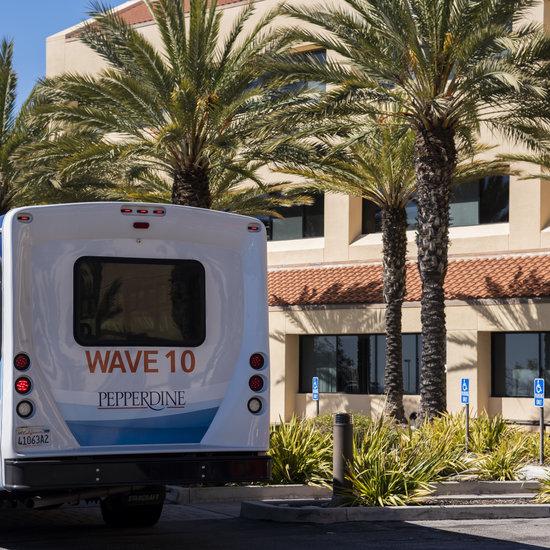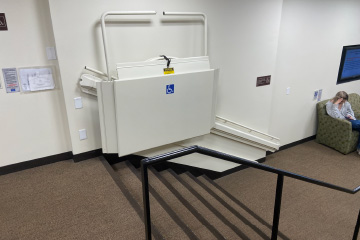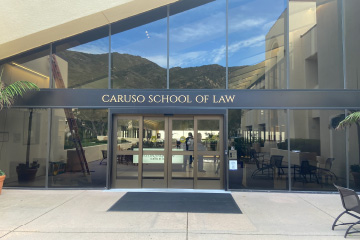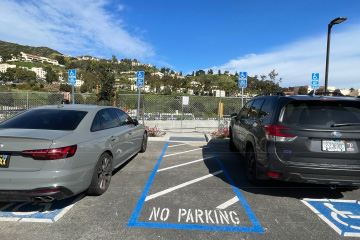Campus Accessibility Initiatives Foster Safety and Success for University Community

Since its founding in 1937, Pepperdine University has prepared students for lives of purpose, service, and leadership. Beyond its foundational mission and guiding vision, the University has nurtured an environment in which all members of the community can thrive. Providing a campus experience that not only provides opportunities for academic excellence and personal growth but is also accessible for all students has been and remains a top priority for the University.
Constructed in 1971, the Malibu campus has been continuously upgraded to address the ever-changing needs of the University’s growing population as well as to ensure compliance with federal regulations and the Americans with Disabilities Act (ADA). According to Ben Veenendaal, associate vice president of the University’s Planning, Operations, and Construction department, Pepperdine audits the accessibility of its original buildings and implements both proactive and retroactive solutions and upgrades to ensure they are compliant for all. The University also ensures the accessibility of its structures during new construction projects.

“The goal is to not only be code compliant, but to ensure the safety and success of all of Pepperdine’s community members,” shares Veenendaal. “We have completed dozens of projects to improve accessibility throughout the years, and a lot of work and care has gone into each one.”
Paul Rizzo, project director for the Department of Design and Construction, shares that Pepperdine continually commits significant time, planning, effort, and financial resources to enhance accessibility across University facilities. In collaboration with architects on staff, Rizzo and his team routinely work with the Office of Student Accessibility and Student Life staff and other University accessibility advocates to ascertain the highest priorities for enhancing accessibility. Additionally, they work continuously with companies and agencies with certified expertise in accessible design, including state-licensed California Access Specialists, the Los Angeles County Department of Building and Safety, and the American Institute of Architects, who provide or endorse much of our architects' routine accessible design training.
“We want to make sure students with accessibility needs can live and fully experience the wonders of the Pepperdine campus,” shares Rizzo. “By partnering withexperts and community members to help identify and address these types of barriers, we are constantly striving to ensure Pepperdine is a place where everyone can be successful.”
According to Rizzo, the many enhancements and accessibility measures that have been implemented across the Malibu campus include accessible parking spaces, handicap push-plates for building entrances, a shuttle service and physical assistance for riders, and wheelchair-accessible housing designated for students requiring it.
 In recent years, nearly 20 entry doors have been reconstructed to administer automated
openers at numerous buildings, including at the Tyler Campus Center, Elkins Auditorium,
Payson Library, Rockwell Academic Center, Appleby Center, Cultural Arts Center, Pendleton
Learning Center, Caruso School of Law, Graziadio Business School, Center for Communication
and Business, Howard A. White Center, Firestone Fieldhouse, and Seaside Residence
Hall. These upgrades were not required by the building code, but were voluntary on
the University’s part. Additional door automation projects are planned for the near
future, including the south entrance to the Caruso School of Law in summer 2024. Pepperdine
also employs accessible shuttles and provides physical assistance to those who request
it and offers custom Braille maps for visually impaired students.
In recent years, nearly 20 entry doors have been reconstructed to administer automated
openers at numerous buildings, including at the Tyler Campus Center, Elkins Auditorium,
Payson Library, Rockwell Academic Center, Appleby Center, Cultural Arts Center, Pendleton
Learning Center, Caruso School of Law, Graziadio Business School, Center for Communication
and Business, Howard A. White Center, Firestone Fieldhouse, and Seaside Residence
Hall. These upgrades were not required by the building code, but were voluntary on
the University’s part. Additional door automation projects are planned for the near
future, including the south entrance to the Caruso School of Law in summer 2024. Pepperdine
also employs accessible shuttles and provides physical assistance to those who request
it and offers custom Braille maps for visually impaired students.
Other areas of improvement across the Malibu campus include a fully accessible path to the main campus from the Thornton Administrative Center; wheelchair-accessible dorm rooms, building access, and parking spaces at the Seaside Residence Hall; an upgraded and fully accessible fitness center; wheelchair-accessible apartments, access paths and parking at the Drescher Student Apartments; more accessible parking and an accessible path to the Firestone Fieldhouse and Heritage Hall; an accessible path at the Tyler Campus Center; and a redesigned access point to thePayson Library elevator for students and the public.
A priority project, according to Veenendaal, was improving the accessibility to the Eddy D. Field Stadium to better accommodate community members and guests during sporting events. “Pepperdine recently designed and constructed numerous accessible parking spaces, including accessible electric vehicle charging spaces, at the baseball stadium and implemented fully accessible pathways from the parking lot to both the top and the bottom of spectator seating, as well as to the baseball field to accommodate all attendees' needs,” shares Veenendaal.

Accessibility is also a top priority at the University’s international campuses. At the newly opened Château d'Hauteville in Switzerland, Pepperdine ensured the installation of two elevators. In the orangerie, an elevator was installed to service all floors and provide greater accessibility to the dining hall, kitchen, terrace, and delivery access areas. To provide accessibility between all three floors of the château and the wine cellar, a metal-and-glass elevator was also installed. The elevator divides the cellar into two parts, which is a functional reinterpretation of the historical separation-formerly created by a stone wall with a large, high door- between the cellar where the wine casks were stored and the room that housed the wine presses. Nicolas Delachaux, lead architect on the remodel, shared with Pepperdine Magazine that situating an elevator within the confines of the château proved a challenging task. He stated, “One of our technical experts’ liveliest debates centered on how to make the cellar more accessible for campus events and other public activities.” After much deliberation with the Swiss authorities, the team was able to implement the elevators without disrupting the integrity of the historic monument.
“So much goes into every update and new build on campus,” says Rizzo. “It's more than just the physical advancements. It's also the longevity of the accessibility measures and the greater impact that will be made on the community in need of these accommodations to better thrive at Pepperdine.”